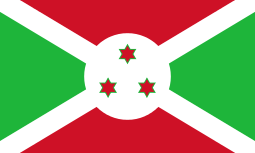Media of Burundi
| Part of a series on the |
| Culture of Burundi |
|---|
 |
| History |
| People |
| Languages |
| Cuisine |
| Religion |
|
Music and performing arts |
| Sport |
|
Symbols |
|
Media in Burundi is controlled by the government.
Telephone
In 2003 in Burundi, there were an estimated three mainline telephones for every 1,000 people; about 4,700 people were on a waiting list for telephone service installation. The same year, there were approximately nine mobile phones in use for every 1,000 people.
Radio and television
- See also: List of radio stations in Africa: Burundi
In 2001, there were four FM radio stations, two of which were owned by the government, including the Voice of the Revolution, broadcasting in Rundi, Swahili, French, and English. There were eight privately owned radio stations in 2004, including Radio Isanganiro, Bonesha FM, and African Public Radio (RPA); all of these are broadcast in French, Rundi, and Swahili. Some stations receive funding from international donors. Transmissions can be received from British Broadcasting and Radio France Internationale.
A television service, Télévision Nationale du Burundi, was established in 1984, and began colour transmission in 1985. In 2004, there was only one television station, which was owned by the government. In 2003, there were an estimated 220 radios and 35 television sets for every 1,000 people.
Internet
The same year, there were 1.8 personal computers for every 1,000 people and two of every 1,000 people had access to the Internet. There were two secure Internet servers in the country in 2004.
The government issues a French-language daily, Le Renouveau du Burundi, with a circulation of 20,000 in 2002, and several periodicals, including a weekly newspaper, Ubumwe, published in Kirundi, with a 1999 circulation of 20,000, and Burundi Chrétien. There were five private weekly papers as of 2004 and eight private Internet and fax news sheets.
- Arc-en-Ciel
- Burundi Chrétien
- Burundi Tribune
- Le Renouwveau du Burundi
- Ubumwe
Freedom of Speech
Though there are no official restrictions upon expression or the press, the regime owns the only daily newspaper and two of the major radio stations, and information is said to be slanted toward pro-government opinions.
See also
Bibliography
- "Burundi: Directory: Broadcasting and Communications". Africa South of the Sahara 2004. Regional Surveys of the World. Europa Publications. 2004. p. 158. ISBN 1857431839.
- "Burundi", Freedom of the Press, USA: Freedom House, 2016, OCLC 57509361